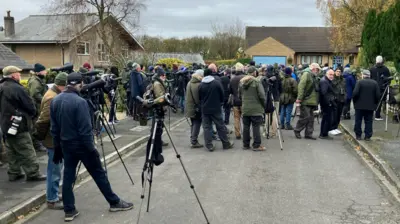We've updated our Privacy and Cookies Policy
We've made some important changes to our Privacy and Cookies Policy and we want you to know what this means for you and your data.
Glenavy chicken litter incinerator is approved
A chicken litter incinerator at Glenavy in County Antrim will create 300-400 construction jobs and 30 permanent jobs the environment minister has said.
Edwin Poots announced on Tuesday that he had approved plans for the biomass-fuelled power plant.
The power plant will be fuelled by poultry bedding and meat and bone meal.
It will produce approximately 30 megawatts of electricity as an output of the incineration process.
The incinerator plans have long been opposed by many of the residents in the area beside Lough Neagh where it is to be built.
The residents have raised petitions and visited Stormont as part of their campaign against it.
The Communities Against the Lough Neagh Incinerator (CALNI) said it intends to legally challenge Mr Poots' decision to grant planning approval for the Rose Energy Incinerator.
CALNI president Danny Moore described it as "one of the worst planning decisions ever made in Northern Ireland".
"The fact that it has been made by a locally-elected minister in the face of such overwhelming opposition marks a complete failure of both planning policy and the democratic process.
"If this is the minister's response to criticism about John Lewis and Belfast City Airport, he is playing a very dangerous game," he added.
Mr Moore said the planning application should go to a Public Inquiry.
"CALNI has consistently warned Minister Poots and Rose Energy that if they chose to pursue this incinerator proposal at Glenavy, CALNI would fight them every step of the way, for years if necessary, all the way to the European Court of Justice.
"The Minister's decision does not mark the end of this process, but only the end of the beginning"
A planning application was submitted in June 2008 by Rose Energy Ltd, accompanied by an environmental statement.
'Opposition'
Rose is a joint venture by three local companies - O'Kane Poultry, Moy Park and Glenfarm Holdings.
Mr Poots said: "I am fully aware of both the opposition and support for the power plant, and that I have a judgement to make between the benefits of the proposal to the poultry industry and the Northern Ireland economy and the potential adverse impacts on residential amenity and the landscape setting.
"Having given the proposal careful consideration, including visiting the site and viewing it from Lough Neagh, I am satisfied that on balance it should be approved.
"This type of investment is necessary to further stimulate the local economy, something the Executive is striving to secure.
"It is an example of investment that can contribute in many ways, providing long-term work, generating power, supporting local agriculture, and related industries."
Rose Energy's chairman, Tony O'Neill, said they "welcomed" the decision by the Planning Service and look forward to the next stage of the project.
"We have spent over six years researching and developing our proposals and have worked with planning and environmental experts to ensure that our planning application was robust and thorough," he said.
"Throughout this period we have maintained that our proposal represents the best solution for Northern Ireland's agri-food sector, and for achieving our renewable green energy targets, and we are delighted that the minister has recognised its merits.
"This is a win-win scheme for Northern Ireland and it has been embraced as such across the farming, food and business sectors."
'Disappointed'
Randox laboratories - which is based close to the incinerator site - has said it is disappointed with the minister's decision to approve it.
The company, which produces medical diagnostic kits, had objected strongly to the proposal.
Randox had previously warned it was concerned about possible contamination with dioxins and other chemicals and said it may be forced to move some of its production to County Donegal were the incinerator to go ahead.
The company's managing director, Peter Fitzgerald, said: "This has implications for us as a company and could prove to be a problem for us."
Top Stories
More to explore
Most read
Content is not available








